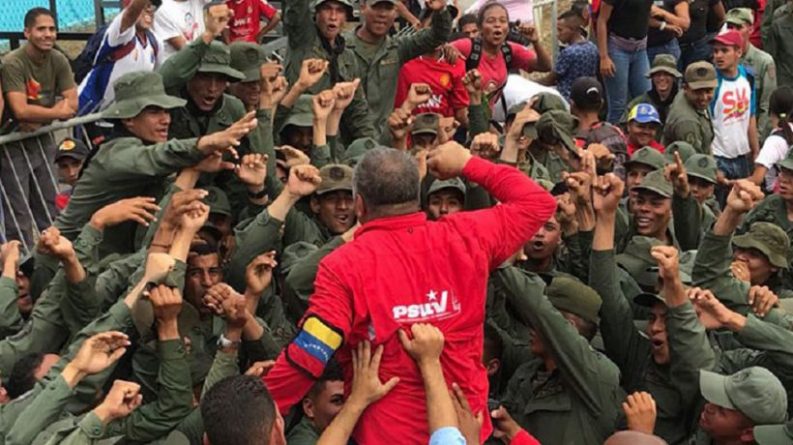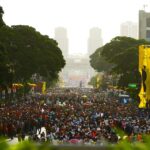
NEGATIVE BALANCE
Almost a month after the self-proclamation of Juan Guaidó as “president in charge”, the balance with respect to the initial objectives on the institutional and military fronts is negative.
Without FANB generals to accompany Washington’s attempt to force Maduro out of power, and with a “Statute of the Transition” issued by the National Assembly with few practical effects on the political reality of the country, his figure wears down between calls for military rebellion and taking for granted the entry of “humanitarian aid” for February 23.
Knowing that his role is ephemeral and circumstantial while Washington’s war cabinet continues to develop the conditions of military action, the so-called “promise of Venezuelan youth” on January 23, one month after its rise in the market as an electoral product, you see your 2.0 leadership in danger in a new “D-Day” where antichavismo puts all the bets.
But perhaps the image that more clearly reflects the negative balance in adding military support against Maduro, was the urgency to burn the cartridge of the former counterintelligence chief, Hugo Carvajal, who in 2017 had already marked a stance against the Venezuelan government, blaming Maduro by the violent protests and marking distance with the proposal of a Constituent to catalyze the conflict.
A defection presented as “novel” and last minute, when its antigovernment stance has been known for two years, took effect for a few minutes and now it seems that it adds a new problem to the management of the coup: managing the costs of integrating into the story of “freedom” a figure detested by the opposing base.
The one of Carvajal leaves them in the same place: a military pronouncement without visible capacity to mobilize troops in favor of Guaidó and the “humanitarian aid”.
INJECTION OF AUTHORITY AND RUSSOPHOBIA
At a certain point, the sense of vertigo under which they operate, with total improvisation and false steps, also reflects the problems in the chain of command that subordinate them to Washington.
The leap back of Elliot Abrams last week affirming that it can not be predicted if Maduro will fall , the refusal of the Congress to authorize the use of military force, the permanent bellicose speech of John Bolton and the pragmatic consensus for peace in Venezuela at an international scale, they stage in their own way the internal war between the west wing of the White House and the Democratic Party, which is devouring Guaidó.
The “humanitarian aid” presented as a turning point and as a story to tear down the “Berlin Wall on the Tienditas Bridge” represents the injection of authority that they need to print on their “interim president” to keep it on the agenda, but also how the discourse of the Cold War and Russophobia becomes a declaration of purpose of the intervention against Venezuela.
MARCO RUBIO IN CÚCUTA AND PSYCHOLOGICAL OPERATIONS THAT REVEAL THE PLAN
Over the weekend, the media industry shifted its attention to the border. One of the reasons was the visit of Senator Marco Rubio and his dream team. His deployment by the front groups managed by USAID with the Colombian government was close to that of a political meeting with which it gave a political and “directive” face to the arrival of three South Command airplanes and the presence of the head of USAID.
As a message to Congress for a resolution that did not contemplate the use of military force meant a political defeat for Rubio, the Republican senator tried to demonstrate authority to become directly responsible for the operation of “humanitarian aid”. The images of the planes landing in Colombia symbolized that moment of personal offensive of the office boy of ExxonMobil.
This was reinforced by the attempt to capitalize media outlets of some protesters with which was intended to give a feeling of supposed widespread support to the “caravan” of deputies of the National Assembly, who are heading to Cúcuta to seek “humanitarian aid” . The senator wasted no time in using a conflict between a active GNB and a driver after the arrest of the “caravan” on the La Cabrera bridge, which connects the state of Aragua with that of Carabobo, to suggest the lynching of the uniformed.
Later, he shared a confusing video on Twitter to get the message that “the regime shoots at demonstrators” in Barinas, without bothering to investigate where the detonations came from. Thus, he denounced the false flag operation that could come in the coming hours to claim dramatically for a military action against Venezuela, under the umbrella of the government attempts against “peaceful demonstrations.”
New video from just outside San Carlos in Cojedes #Venezuela. Report that tear gas wasfired at members of National Assembly aid convoy. Still no clarity on previous reports of shots fired at civilians in another part of the country. https://t.co/4MPRMkIk0d
— Marco Rubio (@marcorubio) February 22, 2019
THE SOUTHERN COMMAND LABORATORY AND THE BRAZILIAN POSITION
But the express presence of Rubio, with the aim of keeping oxygenated the feeling of triumph that they try to impress on the audience, also served as a previous institutional step to mobilize the Southern Commando apparatus.
Spun off the US presidential command, his boss Craig Faller traveled to Brazil, Colombia and Curacao, where he seeks to insert the Southern Command as a preventive weapon for the operation. A role of the rearguard where it would act as a resource of last resort according to the variables developed over the weekend.
In 2018, the Southern Command carried out three military exercises under the “humanitarian relief” scheme, together with Brazil, Colombia and other Latin American countries articulated in the Lima Group. Seen in retrospect, February 23 is the fact that consumes the agenda modeled by the Pentagon, in the voice of John Kelly, when in 2016 it glimpsed that the United States was going to have to respond to the “Venezuelan humanitarian crisis” concerning the former head of the Southern Command.
The joint statement of Craig Faller with the general of the Colombian Navy Luis Navarro Jiménez, to which the previous negotiations with Brazil, Curazao (Holland) and Puerto Rico, suggest that the next step is for the Southern Command to assume the humanitarian “help” “as a bureaucratic task in the name of the “parallel government “.
The distant position of the Brazilian government placing the “humanitarian aid” in Roraima, waiting for Guaidó to resolve its ingress, will elevate the role of Cúcuta and the Dutch Caribbean island as lines of geostrategic pressure towards Venezuelan territory, pointing towards the Gulf of Mexico. Venezuela as a critical artery of the Venezuelan energy trade. This would imply bringing to the territory the strategy of strangulation of the Venezuelan economy.
ELECTIONS DISAPPEAR
In the panorama of means and in the common language used by the spokesmen of the war against Venezuela, the demand for elections has been completely displaced. The discourse that exercises most weight to delimit the course of its political action in these hours is one of military orientation, assault and harassment, represented by the head of the Southern Command, in turn fed by the psychological operations that John Bolton and Mike Pompeo direct against the FANB.
On February 23, following the harsh legal account of the opposition, should be the big day for the holding of elections, for which the deputy Juan Guaidó, stretching several articles of the Constitution like gum, was “forced” to assume as “president in charge” a month ago.
The change of priorities towards the generation of a “casus bellis” from the border that gives a twist to the situation and places the military option as the only possible option, shows that the electoral vindication, following the manual of Gene Sharp, is a resource to escalate the basic operation: guarantee the permanence in the time of a parallel government instructed by the big transnational corporations.
THE LESSON OF IRAQ AND LIBYA AND THE DISMANTLING OF A COUP BY THE CIA
The recent dismantling of a coup orchestrated by the CIA and managed at the operational level by former colonel Oswaldo García Palomo, Julio Borges and the Colombian government for the first quarter of this year, represented a brake on the development of the “military option” that is always on the table for Trump.
Neutralizing this operation, which sought to favor an internal uprising that was linked to external military action at some point in its development, had as an immediate political message the cohesion of the FANB and the practical capacity to protect the security of the State and the country. The fact contrasted with the false image of “failed state” imposed from the corporate media stopped the maturation of two key preconditions for a military adventure, according to the lessons that expose the bloody interventions against Iraq and Libya.
Those preconditions are given by the breakdown of the military apparatus to configure an armed conflict and the precipitation of a civil war of low intensity that deconfigures the country, both are still undeveloped in Venezuela by the preventive action of Venezuelan intelligence and the hard nut to crack, the civic-military union. Without these preconditions, high political costs reduce the effectiveness of an intervention.
THE “HUMANITARIAN TROOPS”: PROJECTION OF A FALSE FLAG
Recently Secretary of State Mike Pompeo thanked NGOs and the private sector for the “humanitarian aid” given to Venezuela. This discourse of business management was the end of a process that had been taking place last week with the creation of a volunteer structure, articulated in the “Coalition of Aid and Freedom” and “Rescue Venezuela”, which act as the mobilization arm of USAID.
The assembly of the movement led to a “troop of humanitarian combatants” dressed in white, in charge of mobilizing aid from the border and serve as the first line of shock with the objective of provoking the FANB. As an artificial construction, this “movement” represents a cover to conceal actions of chaos or technically organized violence, but it also aims to overwhelm and inhibit the action of the State’s security forces.
Unlike the soft coup of 2017, the approach from these “humanitarian troops” is apparently defensive and aims to automatically hold the FANB responsible for any uprising. The homologated use of white color as clothing and identification garment, beyond giving a private Red Cross stature to the USAID business project with Popular Will, is also a useful resource for, at the time of a “massacre” like the many times planned by the United States, highlight the image of bloodshed. The instrumentalization will depend on it.
This false flag operation, that could be forging ahead, measures its impact between more passive and humanitarian provocation action. And the advertising hook is that, supposedly, Chavismo prevents a “humanitarian aid”, which, according to the data presented by Guaidó, does not cover even 1% of the population . The simile with the Syrian “White Helmets” is on purpose, but its use on the border as a ring of civil protection for armed groups will depend on the ability to mobilize paramilitaries. An always latent sign and that from Óscar Pérez indicated the new method to follow. Not for nothing, Trump made him a central figure in his campaign in Florida.
The Russian warning that the United States has mobilized special operations forces to the border, within the framework of a provocation agenda or to arm the opposition, can come here.
Rusia denuncia que EEUU ha movilizado armamento y fuerzas especiales a la frontera colombo-venezolana. @brunosgarzini hace un análisis rápido al respecto. pic.twitter.com/MnQyNEtC0A
— Misión Verdad (@Mision_Verdad) February 22, 2019
Premeditatedly, the United States opens the game, stimulates and finances through little visible channels the emergence of the “Venezuelan Rambo” that, in its upset doctrine of foreign policy, will expel the Russians from Venezuela and return freedom. Libya and Kosovo, to reduce a macabre list in excess, are the glaring examples of how badly a country ends when Washington employs gang and criminal logics (all the time), in complicity with denationalized elites, to seize power.
CONCERT AID LIVE AND NEOLIBERAL LABORATORY
As an asymmetric resource and political weapon to reshape societies, cultural warfare crosses the Venezuelan conflict. The concert “Live Aid”, promoted by the billionaire Richard Branson, picking the most pop of the pop industry for the Latin market, has raised the political and doctrinal discursive boring talk of several employees of the Florida music lobby, at the same level that Sebastián Piñera, Iván Duque and Luis Almagro.
The commercial orientation of the event and its instrumentalization to simulate that the base of support for humanitarian intervention is massive, is so evident that it does not require further analysis. However, the intention to do it one day before February 23, as well as its global coverage, is part of a cultural operation that seeks to soften the border and make the war in Venezuela an extension of pop culture.
The prelude to “freedom in Venezuela” is accompanied by songs by Paulina Rubio and Maluma, an evident demonstration that the managed socio-cultural atmosphere tries to fill with frivolous products a process of deep undermining of Venezuelan society, through sanctions and financial blockade.
And this seems to be the ideological (neoliberal) project that delineates the deep features of the regime change against Venezuela, a maneuver that underpins the destruction of its political and social pact, along with the theft of its natural resources, before which the “humanitarian aid” comes to close the proceeding of the intervention with the intent of returning to Venezuela to its status as semi-colony before Hugo Chavez.
A laboratory that seeks to reshape Venezuelan society based on food dependency on USAID, proposing an economy protected by the transnationals, with a political and social system monitored by the United States, after planned destruction of its collective and patriotic vocation.
At the end of this note, the opposition media took it for granted that the GNB, without verifying or contrasting sources, assassinated an indigenous Pemón, and wounding others, following an irregular situation in the limits with the Brazilian state of Roraima. Immediately afterwards, the spokesmen of the war against Venezuela amplified the intoxication of the act, using it as testimony that the use of force must be used to guarantee the entry of “humanitarian aid”.
A movement complemented by the “order” of Juan Guaidó that the borders are still open according to him, and that any extrapolitical action against Venezuelan sovereignty will have the approval of the “parallel government”. That is why they have raised February 23 as a turning point in the face of the impossibility of achieving regime change.
Translated by JRE/EF
| Website




